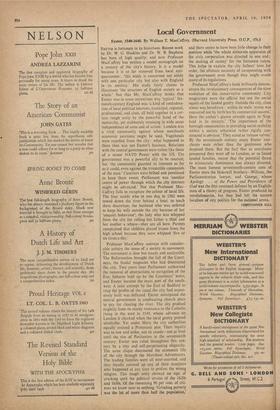Local Government
Exeter, 1540-1640. By Wallace T. MacCaffrey. (Harvard University Press. O.U.P., 45s.)
EXETER is fortunate in its historians. Recent work by Dr. W. G. Hoskins and Dr. W. B. Stephens has been of high quality; and now Professor MacCaffrey has written a model monograph on a century of the city's history. it is a model because it is so far removed from local anti- quarianism : 'this study is concerned not solely with one particular city but also with England in its entirety.' His study fairly claims to illuminate 'the structure of English society as a whole.' Not that Mr. MacCaffrey thinks that Exeter was in some mysterious way 'typical.' Six- teenth-century England was 'a kind of confedera- tion of local political interests, municipal, regional, professional, and class, all held together in a cer- tain rough unity by the powerful hand of the monarchy, yet stubbornly retaining in wide areas independence of aims and of action.' London was a rival community against whose merchants economic sanctions might be used. Vagabonds were expelled from the city : what happened to them then was not Exeter's business. Relations with the central government were rather like those of a minor NATO Power with the US. The government was a powerful ally to be courted; but 'the community guarded its interests as far as it could, even against the irresistible commands of the state.' Courtiers were bribed and pensioned to keep them sweet; Parliament was 'another centre of power through which the city interests might be advanced.' Not that Professor Mac- Caffrey fails to recapture the colour of local life. The four scolds who in one day, in 1562 were towed down the river behind a boat, to teach them discretion; the husband who was ordered to keep his wife outside the city because of her 'unquiet behaviour'; the lady who was whipped from the city for calling her father a thief and her mother a whore—they are all here. Parents complained that children played truant from the high school because they were whipped 'five or six times a day.'
Professor MacCaffrey conveys with consider- able artistry the sense of a society in movement. The movement is slow but steady and analysable. The Reformation brought the fall of the Court- neys, the feudal magnates who had dominated the city. Two years later Parliament authorised the removal of obstructions to navigation of the Exe, hitherto held up by the Courtneys' weirs; and Exeter became the main port of the south- west. A later attempt by the Earl of Bedford to reap the profits of the canal the city had expen- sively built was defeated. Exeter anticipated the central government in confiscating church plate to pay for clearing the river. The city profited mightily from its sturdy resistance to the Catholic rising in the west in 1549, whose advance on London it checked when the local gentry proved unreliable. Yet under Mary the city authorities equally resisted a Protestant plot. Their loyalty was to law and order, not to creeds—not At least until the rise of Puritanism in the seventeenth century. Exeter was ruled throughout this cen- tury by a tiny and self-perpetuating oligarchy. The same clique dominated the economic life of the city through the Merchant Adventurers. The leading families were all inter-married, and they loyally covered up any of their members who happened at any time to profess the wrong religion. This tough unity showed no sign of cracking until the political strains of the 1620s and 1630s. Of the remaining 90 per cent. of citi- zens we know next to nothing. 'Grinding poverty was the lot of more than half the population,'
and there seems to have been little change in their position while 'the whole elaborate apparatus of the civic corporation was directed to one end : the making of money' for the fortunate rulers. This helps to explain the city fathers' love for order, the ultimate necessity of co-operating with the government even though they might evade many of its regulations.
Professor MacCaffrey's book brilliantly demon- strates the revolutionary consequences of the slow evolution of this conservative community. City magistrates were the official but not the social equals of the landed gentry. Outside the city, class status was hereditary : within its walls 'status was measured not by birth but by commercial success.' Here the author's glance extends again to 'Eng- land in its entirety.' The importance of the borough communities in providing social mobility within a society otherwise rather rigidly con- structed is obvious.' They acted as 'release valves.' By the seventeenth century many Exeter mer- chants were richer than the gentlemen who despised them. But the fact that as merchants prospered they went off to London, or to found landed families, meant that the potential threat to aristocratic dominance was always diverted. The most famous seventeenth-century sons of Exeter were the Hakewill brothers—William, the Parliamentarian lawyer, and George, whose Apology . . . of the Power and Providence of God was the first reasoned defence by an English- man of a theory of progress. Exeter produced its revolutionaries, but they had left the narrow localism of city politics for the national arena.
CHRISTOPHER HILL














































 Previous page
Previous page